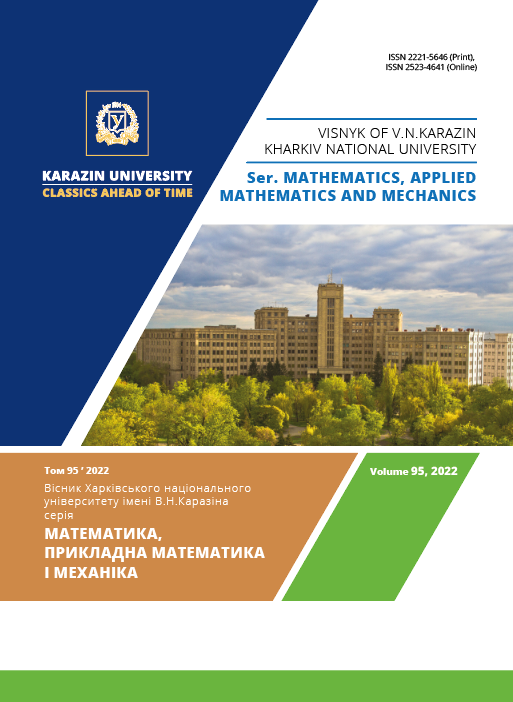Про зв'язок між статистичним ідеалом та ідеалом, породженим модульною функцією
Анотація
Ідеал на довільній непорожній множині $\Omega$ - це непорожня сім'я підмножин $\mathfrak{I}$ множини $\Omega$, яка задовольняє наступним умовам: $\Omega \notin \mathfrak{I}$, якщо $A, B \in \mathfrak{I}$, то $A \cup B \in \mathfrak{I}$, якщо $A \in \mathfrak{I}$ і $D \subset A$, то $D \in \mathfrak{I}$. Теорія ідеалів є дуже популярною областю сучасних математичних досліджень. В даній роботі досліджено деякі спеціальні класи ідеалів на множині натуральних чисел $\mathbb{N}$, а саме ідеал статистичної збіжності $\mathfrak{I}_s$, або статистичний ідеал, та ідеал $\mathfrak{I}_f$, який задано модульною функцією $\mathfrak{I}_f$. Статистичний ідеал -- це сім'я підмножин множини $\mathbb{N}$, які мають нульову натуральну щільність, тобто $A \in \mathfrak{I}_s$ тоді і тільки тоді, коли $\displaystyle\lim\limits_{n \rightarrow \infty}\frac{\#\{k \leq n: k \in A\}}{n} = 0$. Функцію $f:\mathbb{R}^+ \rightarrow \mathbb{R}^+$ називають модульною функцією, якщо $f(x) = 0$ тільки при $x = 0$, $f(x + y) \leq f(x) + f(y)$ для будь-яких $x, y \in \mathbb{R}^+$, $f(x) \le f(y)$ якщо $x \le y$, $f$ неперервна справа в 0, і $\lim\limits_{n \rightarrow \infty} f(n) = \infty$. Ідеал, який задано модульною функцією -- це сім'я підмножин множини $\mathbb{N}$, які мають нульову $f$-щільність, тобто $A \in \mathfrak{I}_f$ тоді і тільки тоді, коли $\displaystyle\lim\limits_{n \rightarrow \infty}\frac{f(\#\{k \leq n: k \in A\})}{f(n)} = 0$. Відомо, що для довільної модульної функції $f$ ми маємо наступне включення: $\mathfrak{I}_f \subset \mathfrak{I}_s$. В нашій статті ми даємо повний опис таких модульних функцій $f$, що $\mathfrak{I}_f = \mathfrak{I}_s$. Далі ми досліджуємо отриманий результат, наводимо деякі часткові випадки основного результату та доводимо просту достатню умову для рівності $\mathfrak{I}_f = \mathfrak{I}_s$. Останній розділ нашої роботи присвячено розгляду прикладів конкретних модульних функцій $f$, для котрих $\mathfrak{I}_f = \mathfrak{I}_s$ і $\mathfrak{I}_f \neq \mathfrak{I}_s$. А саме, у випадку $f(x) = x^p$, при $p \in (0, 1]$ маємо $\mathfrak{I}_f = \mathfrak{I}_s$; якщо $f(x) = \log(1 + x)$, маємо $\mathfrak{I}_f \neq \mathfrak{I}_s$. Далі в якості прикладу ми розглядаємо більш складну функцію $f$, яка має рекурентну побудову, і яка показує, що умови основного результату даної роботи не можна послабити до одного часткового випадку.Завантаження
Посилання
A. Aizpuru, M. C. Listan-Garcia, F. Rambla-Barreno. Density by moduli and statistical convergence. Quaestiones Mathematicae. - 2014 - Vol. 37, No 4. - P. 525-530. DOI: 10.2989/16073606.2014.981683.
M. C. Listan-Garcia. $f$-statistical convergence, completeness and $f$-cluster points. Bull. Belg. Math. Soc. Simon Stevin. - 2016. - 23 (2). - P. 235-245. DOI: 10.36045/bbms/1464710116.
V. M. Kadets, D. D. Seliutin. Completeness in topological vector spaces and filters on $mathbb{N}$. Bull. Belg. Math. Soc. Simon Stevin. - 2022. - 28 (4). P. 531 - 545. DOI: 10.36045/j.bbms.210512.
Автори, які публікуються у цьому журналі, погоджуються з наступними умовами:
1. Автори залишають за собою право на авторство своєї роботи та передають журналу право першої публікації цієї роботи на умовах ліцензії Creative Commons Attribution License, котра дозволяє іншим особам вільно розповсюджувати опубліковану роботу з обов'язковим посиланням на авторів оригінальної роботи та першу публікацію роботи у цьому журналі. (Attribution-Noncommercial-No Derivative Works licence).
2. Автори мають право укладати самостійні додаткові угоди щодо неексклюзивного розповсюдження роботи у тому вигляді, в якому вона була опублікована цим журналом (наприклад, розміщувати роботу в електронному сховищі установи або публікувати у складі монографії), за умови збереження посилання на першу публікацію роботи у цьому журналі.
3. Політика журналу дозволяє і заохочує розміщення авторами в мережі Інтернет (наприклад, у сховищах установ або на особистих веб-сайтах) рукопису роботи, як до подання цього рукопису до редакції, так і під час його редакційного опрацювання, оскільки це сприяє виникненню продуктивної наукової дискусії та позитивно позначається на оперативності та динаміці цитування опублікованої роботи (див. The Effect of Open Access).




